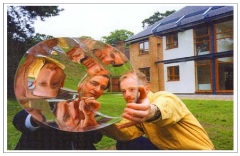Os artigos indefinidos designam substantivos. No português os artigos indefinidos são [um] e [uma]. Já na língua inglesa eles são [A] e [An]. Você não sabe ainda como usar cada um deles? Fique ligado nessas dicas abaixo que o Blog do Enem preparou pra você.
Usar os artigos indefinidos no inglês pode parecer difícil, já que em português, ao contrário do inglês, eles variam em gênero (feminino e masculino) e número (singular e plural). Para usá-los corretamente no idioma inglês é necessário prestar atenção à letra que substantivo inicia.
Se o substantivo começar com uma vogal, como é o caso da palavra egg, então a partícula de artigo usada será o [An], ou seja, [an egg]. Se, ao contrário, o substantivo for iniciado por uma consoante, como no caso da palavra table, o artigo [A] deve ser usado, ou seja [a table].

Dica 1: Quer aprender inglês no seu tablet ou celular. Confira aqui cinco aplicativos para você gabaritar as provas de inglês e espanhol: https://blogdoenem.com.br/enem-aplicativos-ingles-espanhol/
Consoantes e vogais – LEntão, como você aprendeu nos parágrafos acima, vamos exercitar aqui. Perceba: Um ovo sobre uma mesa – AN egg on A table. E assim por diante. Vamos lá?
| A cow | AN aple | A book | AN orange |
| A bird | AN instant | A brush | A table |
E os substantivos que começam com [H]?
A princípio, uma palavra que se inicia com a letra [H] é precedida pelo artigo [A]. Você pode verificar aqui: em: [a horse], [a house], [a hoop].
Mas o mais importante, na escolha do artigo não é somente se o início da palavra é com consoante ou com vogal. O que é realmente importante é o som que a primeira sílaba possui. Por exemplo, se o som da primeira sílaba for o de uma vogal então o artigo será [An], mesmo que a palavra se inicie com consoante. Este é o caso da palavra [Hour]. O correto é dizer: [an hour], pois o [H] é mudo. O mesmo vai acontecer em outras situações.
Confira! Antes de continuar, que tal assistir essa videoaula do canal Curso Enem Gratuito, do Youtube, para fixar o conteúdo?
Dica 2: O Enem está chegando. Veja quais os principais conteúdos que você precisa revisar para se dar bem na prova de língua: https://blogdoenem.com.br/revisao-enem-ingles-espanhol/
O som
 De fato, o som é o fator mais importante na definição do artigo a ser utilizado. Outro que merece a sua atenção é o pronome [you]. Esse é um som que aparece no início de algumas palavras que iniciam com vogais.
De fato, o som é o fator mais importante na definição do artigo a ser utilizado. Outro que merece a sua atenção é o pronome [you]. Esse é um som que aparece no início de algumas palavras que iniciam com vogais.
Veja o exemplo:
[University]: O correto é [a university]. Mesmo que a palavra comece com [U], o que importa na definição do artigo é o som, nesse caso o som de [you]. O mesmo som pode ser encontrado nas seguintes palavras: [european] – [a european] e [uniform] – [a uniform].
Portanto, ao tratar de artigos, o que mais importa para acertar é o som que as palavras têm.
Outra dica é: os artigos não designam somente substantivos em inglês. É possível que o substantivo venha junto com um adjetivo. Neste caso, o som da letra que inicia o adjetivo é o vale. Por exemplo, [old]- [an old man]; [big]- [a big house] e [excellent] – [an excellent movie].
Preste atenção aos sons que as palavras fazem para acertar nas questões sobre artigo. Você pode estudar melhor sobre os artigos escutando músicas em inglês, prestando atenção nos artigos que são usados.
Dica 3: Você já conhece o jogo Feel the Music? Com ele você pode aprender inglês através de músicas. Confira essa dica aqui: https://blogdoenem.com.br/feel-the-music-enem/
Responda as 10 questões do Simulado Enem Online de Inglês e teste o que aprendeu:
Indefinite article
Sumário do Quiz
0 de 10 questões completadas
Perguntas:
- 1
- 2
- 3
- 4
- 5
- 6
- 7
- 8
- 9
- 10
Information
.
Você já fez este questionário anteriormente. Portanto, não pode fazê-lo novamente.
Quiz is loading...
You must sign in or sign up to start the quiz.
Para iniciar este questionário, você precisa terminar, antes, este questionário:
Resultados
0 de 10 perguntas respondidas corretamente
Seu tempo:
Acabou o tempo
Você conseguiu 0 de 0 pontos possíveis (0)
| Pontuação média |
|
| Sua pontuação |
|
Categorias
- Sem categoria 0%
- 1
- 2
- 3
- 4
- 5
- 6
- 7
- 8
- 9
- 10
- Respondido
- Revisão
-
Pergunta 1 de 10
1. Pergunta
(ITA)
________ Pacific and ________ Atlantic are ________ oceans. ________ Alps are ________ mountains, and ________ Amazon is a river.
Correto
Parabéns! Siga para a próxima questão.
-
Pergunta 2 de 10
2. Pergunta
(UNIP)
It’s ________ honor to meet ________ young lady from ________ Sweden.
Correto
Parabéns! Siga para a próxima questão.
-
Pergunta 3 de 10
3. Pergunta
¹“Fan” is …….. abbreviated form of ²“fanatic”, which has …….. roots in …….. Latin word “fanaticus”, which simply meant “belonging to the temple, a devotee”. But these words quickly assumed negative connotations, to the point of becoming references to excessive religious belief and to any mistaken enthusiasm.
Based on such connotations, news reports frequently characterize fans as psychopaths …….. frustrated fantasies of intimate relationships with stars or unsatisfied desires to achieve stardom take violent and antisocial forms. Whether viewed as a religious fanatic, a psychopathic killer, a neurotic fantasist, or a lust-crazed groupie, the fan remains a “fanatic” with interests alien to the realm of “normal” cultural experience and a mentality dangerously out of touch with reality.
To understand the logic behind this discursive construction of fans, we must reconsider what we mean by taste. Concepts of “good taste,” appropriate conduct, or aesthetic merit are not natural or universal; rather, they are rooted in social experience and reflect particular class interests. Taste becomes one of the important means by which social distinctions are maintained and class identities are forged. Those who “naturally” possess appropriate tastes “deserve” a privileged position, while the tastes of others are seen as underdeveloped. Taste distinctions determine desirable and undesirable ways of relating to cultural objects, strategies of interpretation and styles of consumption.
The stereotypical conception of the fan reflects anxieties about the violation of dominant cultural hierarchies. The fans’ transgression of bourgeois taste disrupt dominant cultural hierarchies, insuring that their preferences be seen as abnormal and threatening by those who have an interest in the maintenance of these standards (even by those who may share similar tastes but express them in different ways).
Adapted from: JENKINS, Henry. Textual Poachers: Television Fans and
Participatory Culture. New York / London: Routledge, 1992. p. 12-16.Select the alternative which correctly fills in the gaps in references 1 and 2, in the order they appear.
Correto
Parabéns! Siga para a próxima questão.
-
Pergunta 4 de 10
4. Pergunta
(Unemat MT/2012)
LIVING WITHOUT ENERGY

(1) Everyone says that we must use less energy! But how? That is the big question. In this article, you can read about the house of the future, which uses hardly any energy at all…
Most houses use energy – lots of it. We use energy for heating, (5) lighting, for running our household appliances – TV’s, washing machines, fridges, and so on. In winter time, most houses use dozens of kilowatts of electricity every day, or the equivalent in gas.
The house in the photo, on the other hand, uses virtually nothing: (10) most of the energy that it uses comes straight from the sun, the wind or the ground. This is an experimental house at the University of Nottingham, and it could be the kind of house that most people are living in fifty years from now.
During the daytime, it is rarely necessary to turn on an electric (15) light, even in rooms without windows. Sunlight, or daylight, is “piped” through the house, into each room, through special high-reflection aluminium tubes. You can see how well they reflect light, by looking at the reflections of the faces in the picture!
http://linguapress.com/intermediate/no-energy.htm
Na frase “This is an experimental house at the University of Nottingham” (ref. 10), observe o artigo sublinhado e assinale a alternativa correta.
Correto
Parabéns! Siga para a próxima questão.
-
Pergunta 5 de 10
5. Pergunta
(UFAC/2002)
Assinale a alternativa na qual o uso do artigo está incorreto:
Correto
Parabéns! Siga para a próxima questão.
-
Pergunta 6 de 10
6. Pergunta
(UNIFOR CE/1998)
“Gordon Sumner is ___ exceptionally good-looking man, idolized by millions and so rich he can afford all he could ever wish for. Better known as Sting, he was the lead singer of The Police. His naturally fair hair ___ replaced the dyed blond hair of his stage act. But still the face magnetizes − the voice is low and husky, the eyes are bright and intelligent. “It is hard to be a pop-star”, he says, “I can’t walk ___ a street any more without feeling people are watching me, I can’t be anonymous any longer, and that is a drag.”
Correto
Parabéns! Siga para a próxima questão.
-
Pergunta 7 de 10
7. Pergunta
(MACK-SP)
Paul, _____ doctor, was _____ first person in _____ city to swim in _____ Mississipi River on _____ tenth of _____ October, 1970 and in ____ Lake Michigan in _____ 60s.
Correto
Parabéns! Siga para a próxima questão.
-
Pergunta 8 de 10
8. Pergunta
(FAC.DIR.-PR)
Smith, _____ man you met yesterday is _____ honest man.
Correto
Parabéns! Siga para a próxima questão.
-
Pergunta 9 de 10
9. Pergunta
(UFSM/2012)
Mark the alternative that complete the sentence correctly:
_______angry boyfriend is ______unpredictable man.
Correto
Parabéns! Siga para a próxima questão.
-
Pergunta 10 de 10
10. Pergunta
(UFES/2016)
Assinale a questão em que o artigo “The” não é necessário:
Correto
Parabéns! Siga para a próxima questão.
Post escrito por Victor Barreto, que se formou em jornalismo. Reside em São Paulo. Já atuou como professor de inglês em diversas escolas, como Cultura Inglesa, Yázigi e United Institute, além de ter trabalhado como assistente editorial. Atualmente, realiza traduções, dá aulas particulares de inglês e atua como redator online. Twitter: @victor_toscano

